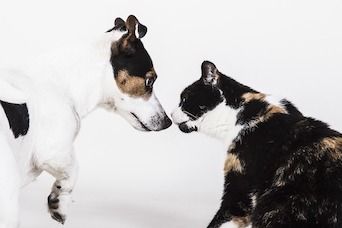Dogs May Be Smarter Than Cats, But Which Animal Is the Smartest?
After counting the number of cortical neurons in 8 diverse carnivorous species, researchers found that dogs possess significantly more than cats. But it’s raccoons that reign supreme.

In the first study of its kind, international researchers have counted the number of cortical neurons—which are associated with thinking, planning, and complex behavior—in the brains of cats and dogs. As it turns out, dogs have more than twice the number of neurons that cats do, 530 million compared with 250 million.
“I'm 100 percent a dog person, but with that disclaimer, our findings mean to me that dogs have the biological capability of doing much more complex and flexible things with their lives than cats can,” said Suzana Herculano-Houzel, PhD, MSc, BSc, the neuroscientist and associate professor at Vanderbilt University who developed the method for measuring the number of neurons.
“At the least, we now have some biology that people can factor into their discussions about who's smarter, cats or dogs."
Adding accolades to the canine team, the investigators also found that dogs had the most neurons of any carnivore, even though they didn't have the largest brains.
RELATED:
- Cats and Dogs: Equal Brain Power?
- Smile! Your Dog Loves It
“I believe the absolute number of neurons an animal has, especially in the cerebral cortex, determines the richness of its internal mental state and its ability to predict what is about to happen in the environment based on past experience,” Dr. Herculano-Houzel explained.
But the heart of the study goes beyond the dog and cat brain debate. The researchers were interested in comparing different species of carnivorans to see how neuron counts related to brain size. To do so, 1 or 2 specimens from ferrets, mongooses, raccoons, cats, dogs, hyenas, lions, and brown bears were analyzed.
The study uncovered that the brain of a golden retriever, with 620 million neurons, has more than a hyena, lion, or brown bear, even though the bigger predators have brains up to three times as large. On the other side of the spectrum, bears only had one-fifth of the neurons researchers expected to find. In fact, bears and cats have about the same number of neurons, even though a bear’s brain is 10 times larger.
The standouts in the group were raccoons, which presented results unlike those of the typical carnivoran. Although they have cat-sized brains, the number of neurons in raccoons is on par with that in dogs. This brain-size to neuron-count ratio is proportionate to primates. (Comparatively, humans have 16 billion cortical neurons.)
“Yes, there are recognizable patterns, but there are multiple ways that nature has found of putting brains together—and we're trying to figure out what difference that makes,” Dr. Herculano-Houzel said.